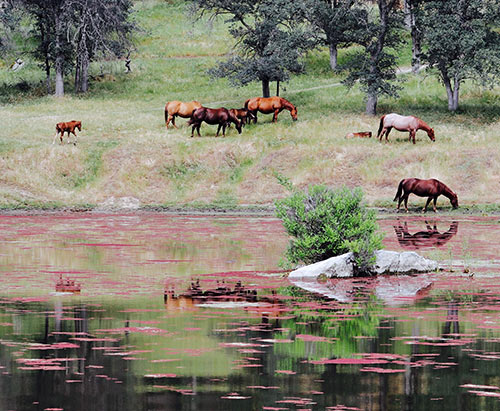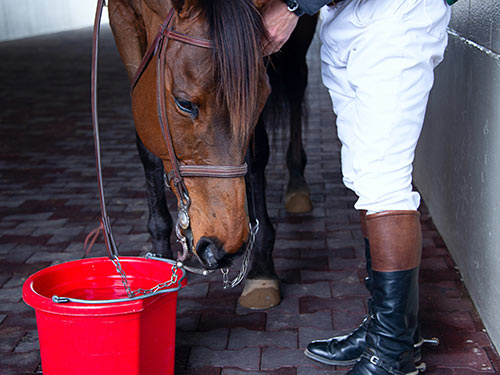Did you know, a horse can go 25 days without food but only around 5 days without water. After this time the internal organs begin to shut down. Water is needed to regulate horse temperature, help digest food and absorb essential nutrients. If a horse becomes dehydrated it can seriously impact health.
Horses lose a lot of fluid through sweat and breathing. If illness or diarrhea occurs this can cause fluid levels to deplete much faster. Equine sweat is hypertonic which means it contains more salts than bodily fluids and as a result loses more electrolytes than water.

What to Look for in a Dehydrated Horse
How can you tell if your horse is dehydrated? Here are just a few things to check:
Heart Rate
The resting heart rate should be around 60 beats a minute. If it’s higher than this it could be an indication of dehydration.
Dark Urine
A dark colour urine or less frequent passing is cause for concern.
Breathing
Regular short breaths could be a sign your horse is dehydrated.
Moist Eyes and Gums
The eyes and gums should be well hydrated and shiny. If the gums appear to be redder and the eyes aren’t shiny this should be checked.
Capillary Refill
Lightly press the gum near your horse’s upper teeth. The skin should go pink or white but quickly return back – if it takes longer than a couple of seconds this is a sign of dehydration.
Top Tips to Keep Your Horse Hydrated
 Fresh Water Supply
Fresh Water Supply
Keep a regular and fresh supply of water for your horse. Ensure the bucket is regularly cleaned out and free from hay or other soiling.- Temperature
Optimal temperature for a horse drinking water is lukewarm, which is around the 15-degree mark. Too cool or too warm means he may not drink as much. In warmer temperatures make sure the water is out of direct sunlight to avoid heating up. - Plan Your Route
If you’re going out on adventures then plan your route so there’s a safe place to stop and check your horse. Here you can make sure he isn’t overheating in warmer temperatures and provide water if needed. - Add Salt
If your horse doesn’t appear to be drinking as much as usual then try adding salt to his diet to stimulate thirst. Don’t add too much salt though as this can have the adverse effect and dehydrate him! - Cool Off
After exercise if your horse is overheated, cool him off with cold water and dry off any excess water. This should help bring the body temperature down. - Electrolytes
Water alone will not hydrate an already dehydrated horse as they need electrolytes to hold the water. Add electrolytes to drinking water and feed if needed but also provide an option without in case this is their preference. Only add electrolytes when needed; too much will be passed out in the urine. - Soak Hay
If you’re horse isn’t able to get out for fresh forage then soak the hay in water. Fresh forage has a high moisture content which helps keep him hydrated.
On warmer days it goes without saying to try and keep your horse in the shade where possible. Follow the steps above when needed and make sure you have a clean and fresh supply of water at all times.
While your horse is now fully hydrated make sure they are supremely comfortable in the stable with a Mayo Mattress.
